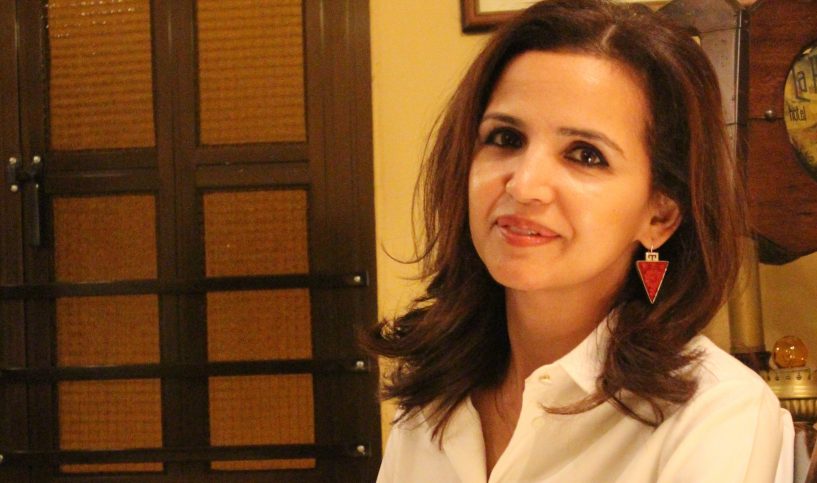Forty something, Kuwaiti, woman, has career, and has hobbies. These are all labels that we, and many others, place on ourselves to give off a sense of identity. When asked to introduce herself Nejoud Al Yagout found the answer she had given hilarious, “It seems as though I’m on autopilot saying that. We come to Earth nameless, ageless, and nationless. Somehow I am beyond my age, name, and country.” A fascinating answer from a fascinating woman, words are definitely this wordsmith’s weapon. With a passion for the written word, Nejoud is a fulltime librarian who found herself writing in her pastime. The results of this “hobby” manifested itself into a collection of poetry that she fondly named This Is An Imprint.
You’re a librarian. How does one get into this career path and what do you love most about your job? What inspired you to write?
Actually, getting the job was serendipitous. I am so grateful for my job because I love being surrounded by books and students. Working in a school is so rewarding.
I draw my inspiration from love and life. Spirituality deeply moves me as well. When we ask the essential questions of life, we move from existential dread to awakening. The journey itself inspires me.
Are poems your go-to writing style of choice, or do you write in other styles?
Definitely, although I also enjoy writing letters to people. Well emails, in this day and age…
Who are the people that influence your writing?
My nearest and dearest never cease to amaze and inspire me. I derive inspiration from those who I have loved the most or those who have hurt me the most. Always, they are one and the same! Then, there are the poets that inspire me. Richard Brautigan – a Beat Generation poet – is a personal favorite. However, I’m moved by a wide range of poets from Pablo Neruda to Rabindrath Tagore, Emily Dickinson to Robert Browning, and from Rumi to E.E. Cummings.
What is your book about?
My book consists of 58 poems and 58 responses. There is no significance to the number. It just turned out that way. Each pair of poems consists of one poem – which is written from a frequency of angst, loss, identity crisis or heartbreak – and its response, which is written from a higher level of consciousness. For example, the first poem is confusion.com and its answer is No more confusion.com. I wanted to let the reader understand that no matter how dark life can appear, there is always a more elevated perspective that can alleviate our suffering.
How did the compilation of poems come together?
Some of the poems were written when I was in university. Others are very new. When someone who resides in my heart was dying of cancer earlier this year, it was cathartic to write poems for and to him. It is an honor that I can somehow keep his memory alive in this book by including a couple of poems that were dedicated to him. The other poems are therapeutic musings and reflections of life experiences. The book is neither in chronological order nor in order of importance. It had a life of its own when I was compiling the poems together.
What inspired the title? What is the book an “imprint” of?
When I was in high school, my favorite book was Richard Wright’s Native Son. He used the phrase ‘indelible imprint’ and I fell in love! I find that whatever we offer to the world is an imprint – whether it is a smile or a book.
Is there a recurring theme throughout?
A recurring theme is grief. However, each time our hearts are shattered, there is an opportunity to transcend our pain. This is highly stressed in my book so that I do not keep readers stuck in the frequency of angst. So, transcending our pain through awareness and presence is the most essential theme in the book. Spiritual teachers always use the metaphor of the diamond. It can only shine after immense heat and pressure. Another theme is love and its power over us. Ain’t love grand? It can break us into a million pieces, but our hearts continue to love. That’s an art.
Are you in the poems? Or do you take on a different persona when writing?
Yes, I am in the poems. There is no other persona, but I must add that when I say ‘I’ in the poems, it is either my lower self or higher self that is reflecting on any given situation. Both aspects are present and represent the dichotomy of light and darkness that is ever present in our world. Also, when I say ‘I’ am in the poem, there is nothing unique about my feelings. We share a collective consciousness that is beyond our own identity. Our experiences may be different, but our range of emotions and feelings are the same. We are much more connected than we know.
Check out excerpts from the book on YouTube by visiting http://www.youtube.com/results?search_query=this+is+an+imprint
You can order This Is An Imprint by email for delivery at thisisanimprint@gmail.com , or you can visit dar.nur for a copy.











